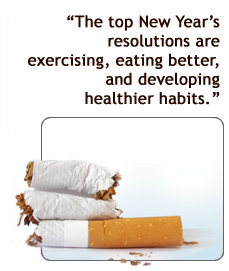 Most of us make New Year’s resolutions, and most of us, again and again, end up blowing most, if not all of them. But it doesn’t have to be that way. New Year’s resolutions can work positive changes into your life. Researchers have actually studied why some people’s resolutions are more likely to fail and how and why others succeed with resolutions that bring about everything from weight loss to a bigger savings account.
 Coming up with resolutions you can stick toWhen University of Scranton psychologists looked at the behaviors of several hundred people who made New Year’s resolutions, they found those most likely to keep them were ready for change, used more strategies to reach goals, and left self-blame and wishful thinking behind.
Consider these tips on making New Year’s resolutions do-able:
- Keep goals simple and realistic. Want to lose weight? Resolving to "lose 30 lbs." or to have a body like a model is, for most of us, a recipe for failure. Pick a more realistic goal like "I will lose a minimum of 5 lbs by March 31st".
- Keep resolutions to a minimum. Writing down 20 things you’d like to change is certain to overwhelm.
- Recognize your accomplishments, even small ones. A food diary or exercise journal can help track progress.
- Keep trying. Berating yourself for slip-ups won’t help.
- Reward yourself as you move toward success. Plan on getting a massage in a month after sticking to an exercise program, or treat yourself to a restaurant meal featuring healthy cuisine ( such as Mediterranean or vegetarian) after losing a few pounds.
Resolving to get healthierResearchers have found the top New Year’s resolutions are exercising, eating better, and developing healthier habits (like quitting smoking or lowering caffeine or alcohol intake) – so the odds are some of these goals are on your list. The way to succeed? Hone in on specific strategies you can fit into your life easily. A case in point: instead of writing down "I will eat healthier" or "I will lose weight" list ways you can change eating patterns without feel deprived.
Some examples:
 - "I’ll give up pizza forever" is a resolution doomed to failure. However, making a goal of eating pizza only once a week, or resolving to go for veggie toppings instead of meat-laden pizzas isn’t a big stretch. But the change can save hundreds of calories over the course of a month.
- Make healthy substitutions in your kitchen to seamlessly cut calories and improve your health.
- Substitute olive oil for other fats in cooking. Studies show you could help your waistline while possibly reducing your risk of several diseases, too.
- Switch to nonfat milk instead of whole milk and save 60 calories per cup.
- Use plain, nonfat yogurt instead of sour cream in recipes and cut out over 700 calories per cup.
- Resolve to eat off small plates and serve reduced portions regularly to drop pounds.
- Instead of declaring you’ll give up coffee cold turkey, especially if you love the smell and taste of java, cut back on caffeine by slowly going from full-tilt caffeinated coffee to a version that is half decaf.
Sticking to your exercise resolutionIf you can successfully resolve to work out regularly at a health club or to use exercise equipment faithfully at home, good for you. But the truth is, health club memberships purchased as part of a New Year’s resolution often go unused, and many a treadmill sits gathering dust and clothes.
Don’t give up resolving to exercise in the New Year, however. Just look for practical, realistic ways to get started and to keep moving.
If you have health problems, or even if you don’t, it’s always prudent to check with your doctor before you start any exercise problem. "Remember that almost everyone can find some level of exercise that is beneficial and can become an integral part of a healthy lifestyle," says Emory Heart Center cardiologist Laurence Sperling, MD, director of Emory’s HeartWise Risk Reduction Program.
 So how do you succeed with a New Year’s exercise resolution? Working out with a partner on specific dates and times can help. But, according to Sperling, you can also resolve to incorporate the common sense strategies below. You’ll increase the amount of exercise you get while hardly producing a blip in your regular daily schedule:
- Commit to schedule fitness into your work day by simply getting up 30 minutes earlier. Take a walk, work out to an exercise video, or participate in a supervised exercise program.
- Park your car at the far end of the parking lot and walk briskly to your office or the store.
- Skip the elevator and take the stairs. You’ll burn calories, improve your cardiovascular fitness, and tone your lower body, too.
- Instead of taking a coffee break, take a move-your-body break. Stand up and stretch, walk around your office building, or go outside for a short walk.
- It’s not necessary to find 30 continuous minutes in order for exercise to be beneficial, Sperling notes. You’ll also benefit by breaking exercise into smaller periods of time. For example, resolve to exercise 10 minutes before work, 10 minutes at lunch, and 10 minutes after work.
Resolving to improve your finances2010 could be the first year people are more interested in improving their bottom lines than their bottoms. But in rough economic times of layoffs, upside down mortgages, credit crunches, and more, are there any New Year’s resolutions that can help?
Alan Kaplan, Ph.D., associate professor of finance at Ryerson University in Toronto, says the answer is definitely "yes". A good place to start: resolve to save money and also cut back on discretionary spending. In fact, says Kaplan, those goals are the same.
He advises making a resolution to save a specific amount of money every week or month. Automatically have it deducted from your bank account or paycheck and deposited into a savings account, mutual fund, or other investments (Kaplan advises sticking to investments with low transaction fees). And if you think there’s no way you can live without that deducted $100 or $200, he says, it is more a psychological problem than a financial one.
"You will be forced to cut back on discretionary spending. You’ll start taking your lunch to work or eating out less," he says. "Do it for 3 months, and the fourth will be easier."
Other practical New Year’s financial resolutions to consider:
- If you’ve lost your job or income and absolutely can not save, resolve to take specific steps to change your current lifestyle so you can live within your means. For example, start taking public transportation. And even if houses aren’t selling in your area, set a goal to proactively network and look for buyers so that when the opportunity does arise, you are ready to sell and move on.
- Resolve to get professional help. Kaplan advises making an appointment with a non-profit credit and financial counseling group, available in most cities. They can’t help increase your income but they can help you figure out the best options for managing and restructuring debts.
|